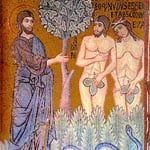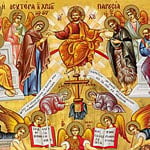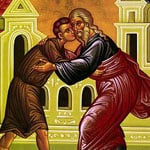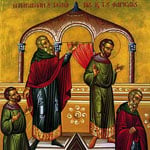Then the righteous will answer Him, "Lord, when did we see Thee hungry and feed Thee,
or thirsty and give Thee drink? And when did we see Thee a stranger and welcome thee, or naked
and clothe thee? And when did we see Thee sick or in prison and visit Thee?"
And the King will answer them, "Truly I say to you, as you did it to one of
the least of these My brethren, you did it to Me."...
Then they (the condemned) will also answer, "Lord, when did we see Thee hungry or
thirsty or a stranger or naked or sick or in prison and did not minister to Thee?"
Then He will answer them, "Truly I say to you, as you did it not to one of the least of these,
you did it not to Me."
Matthew 25:37-40; 44-45
(Gospel on the Sunday of the Last Judgment)
"You are going to die!"
This is the opening line in a book called Be a Man by Fr. Larry Richards, a Roman Catholic priest and writer, and is one of the most unique opening lines of any book I have read. The premise in the opening chapter of this book is to start with the ending of our lives, and where we are going to be, and then work backwards to the present day, making sure that today we are working with that future eventuality in mind.
When the Lord confronted each group of people-the "sheep" and the "goats" -to say that "I was hungry and you gave me food" or "I was hungry and you gave me no food;' each group was surprised. The "sheep" asked "When did we see you (our Lord) hungry?" As if to say, that in all the years of helping people, they never encountered the Lord. Those who were doing good works were doing them almost "naturally:' They weren't ostensibly doing them only for the Lord. Helping others was a normal part of their life. At the end of life, the Lord told them that in loving others, they were showing love to Him as well.
The "goats" were also surprised. When they asked "When did we see you hungry and not feed you?" they were saying in essence, that "had we really seen you hungry, we certainly would have fed you. Had the Lord appeared in the flesh in front of us, certainly we would have known, and cared." For those who weren't helping their neighbors, their indifference was normal for them as well. At the end of life, the Lord told them that in being indifferent to others, they were being indifferent to Him as well.
Every day, probably multiple times a day, we have a chance to show love, or to show indifference to others. There are people who are poor and hungry in every town, people who don't have enough clothes, people who are new in town or new on the job, people who are sick, and those who are imprisoned. Even more frequently, we encounter people who are hungry, not only for food, but for friendship, hungry for compassion, encouragement, empathy. We encounter people who are thirsty for affirmation. There are many people who feel like strangers because they don't have many real friends. There are people who feel naked because they suffer from low self-esteem. There are people who are sick with stress and frustration. There are people who are in prison, serving life sentences of learning disabilities, mental illness or physical handicaps. Do we take time each day to minister to anyone in any of these categories listed above?
In loving others, do we realize that we also love the Lord? When we are indifferent, do we realize we are indifferent to Him as well? Do we make it a goal each day to try to help someone? Is our ministering to other people more "natural" or does it seem "forced" or "contrived"?
I eventually am going to die and stand before God's throne and I will answer to Him for my love of my neighbor as well as my love of Him. With this eventuality in mind, I should look for opportunities today to show love to my neighbor. When we make a point of helping "our neighbor" every day, it becomes a habit, a natural part of our lives. It will set us on the path to being numbered among the "sheep;' who were ministering to the Lord, without even knowing that it was the Lord, because their love of their neighbor was a natural part of their lives.
There is no one who is reading this message that does not love the Lord. I am sure of that. Some of us may not know the Lord as well as we'd like, but everyone who is reading this message has some sense of Godliness in them. The challenge then is to take our sense of Godliness and transfer it over to every encounter with every person we meet today, to see God in them, and to love them in the way we love God, the way God loves us.
I ponder on that day and hour, when we all naked and as convicts, will appear before the Judge we cannot bribe. Then a great trumpet will sound and the foundations of the earth will be shaken, and the dead will be raised from the graves and all will become of one stature. And all that which is hidden will be presented overtly before You, and they shall mourn and wail who have never repented, and they shall depart into the outer fire. And with joy and exaltation will the lot of the righteous enter into the heavenly chamber. (From the Praises of the Sunday of the Last Judgment, Trans. by
Fr. Seraphim Dedes)
Help a neighbor today!
We encourage you to participate in this journey guided by Fr. Stavros in two ways:
Purchase the book "The Road Back to Christ: Reflections on Lent, Holy Week and the Resurrection" by Fr. Stavros N. Akrotirianakis
Join the Prayer Team Daily Devotion email list and receive a reflection like this in your inbox every morning
About Great Lent, Holy Week, and Pascha
There is a 19 Sunday (18 week) period of time each year in the Orthodox Christian Church that surrounds the Feast of Pascha (Easter). The first three weeks, including four Sundays, are called the Triodion, or pre-Lenten period. The next forty days, which includes nearly six weeks and five Sundays, is called Great Lent. In the Orthodox Church, Great Lent begins on a Monday called Clean Monday, rather than Ash Wednesday, as it does in other churches. Great Lent ends on a Friday.
Holy Week follows, along with the Great and Holy Week.
The Feast of the Resurrection is called Pascha and it begins a forty-day period of celebration. After forty days, the church celebrates the Feast of the Ascension. Ten days later (fifty days after the Resurrection), the church celebrates the Feast of Pentecost. The Sunday after Pentecost is the Feast of All Saints. This ends this cycle of "movable feasts" (called this because their date moves every year), which surround the feast of Pascha.
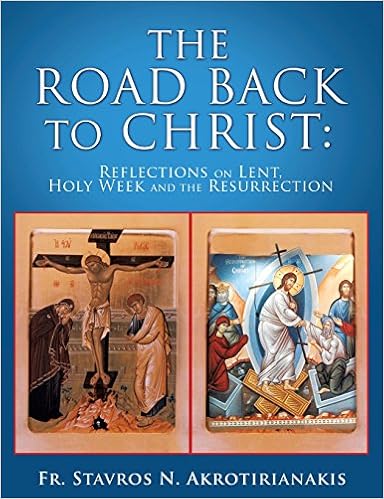 About "The Road Back to Christ"
About "The Road Back to Christ"
The Road Back to Christ: Reflections on Lent, Holy Week and the Resurrection is a series of short daily reflections on the scripture readings of Holy Week and the accounts of the Resurrection and post-Resurrection appearances of Christ. Designed to guide its readers through the journey, it will both inspire and reinvigorate your faith through meditation, prayer, and a deeper understanding of the Passion and Resurrection of Jesus Christ.
About Fr. Stavros
Fr. Stavros Akrotirianakis is the Proistamenos (Presiding Priest) at St. John the Baptist Greek Orthodox Church in Tampa, FL.

